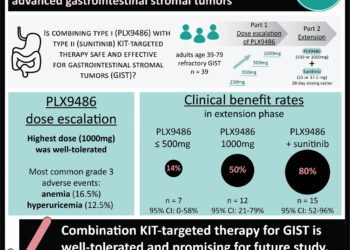Imatinib and binimetinib combination is a potential effective treatment for advanced gastrointestinal stromal tumours
1. Combination-treatment resulted in a best ORR of 69.0% and median PFS of 29.9 months
2. MEK inhibition toxicities included rare incidences of left ventricular ejection fraction decrease or dropped head syndrome
Evidence Rating Level: 2 (Good)
Study Rundown: Gastrointestinal stromal tumours (GISTs) often become resistant to imatinib. This study explored the effect of combination imatinib (KIT and PDGFRα inhibitor) with binimetinib (MEK inhibitor targeting ETV1) on overall response rate (ORR), progression-free survival (PFS), overall survival (OS), and toxicity in adult patients with advanced and treatment-naïve GIST. The primary outcome was best ORR, while secondary outcomes included PFS, OS, and toxicity. 50 patients were enrolled in the study, while 43 were evaluable for toxicity and 42 were evaluable for efficacy. By the study cutoff, ORR was confirmed in 29 patients, with the best ORR being 69%. The median PFS at study cutoff was 29.9 months. Median OS was not estimable, but 72.8% of patients were alive at 48 months. The most common adverse events (AEs) were periorbital and peripheral edema, acneiform rash, and diarrhea, among others. No adverse effects were unexpected and there were no severe AEs due to medications in the trial. Limitations to this study include small sample size. Overall, the of combination imatinib and binimetinib therapy for treatment-naïve advanced GIST is effective and warrants further investigation comparing to frontline imatinib.
Click to read the study in The Journal of Clinical Oncology
In-Depth [randomized controlled trial]: This phase 2, single-centre, single-arm trial enrolled 50 adult patients with treatment-naïve GIST. Patients in the trial received 2 weeks of imatinib-only followed by the combination treatment of imatinib with binimetinib. 42 patients met the eligibility for efficacy assessment and 43 were evaluable for toxicity. The primary outcome was ORR and it was found that the combination-treatment resulted in a best ORR of 69.0% (95% confidence interval (CI), 52.9% to 82.4%). Median PFS at study cutoff was 29.9 months (95% CI, 24.2 months to not estimable). While median OS was not mature, 72.8% (95% CI, 56.9% to 93.1%) of patients were alive at 48 months. Some of the most common adverse events (AEs) included periorbital (69.8%) and peripheral (79.1%) edema, acneiform rash (74.4%), and diarrhea (60.5%). MEK specific inhibition toxicities included left ventricular ejection fraction decrease (2 patients) and dropped head syndrome (3 patients). No adverse effects were unexpected during the trial. 8 patients left the trial because of adverse events associated with treatment
Image: PD
©2022 2 Minute Medicine, Inc. All rights reserved. No works may be reproduced without expressed written consent from 2 Minute Medicine, Inc. Inquire about licensing here. No article should be construed as medical advice and is not intended as such by the authors or by 2 Minute Medicine, Inc.


![[Physician Comment] The extent of C. difficile infections may not differ in light of immune status](https://www.2minutemedicine.com/wp-content/uploads/2012/11/x800px-Clostridium_difficile_01-e1353335581537.jpg.pagespeed.ic_.We5DxZl6Ye-75x75.jpg)

